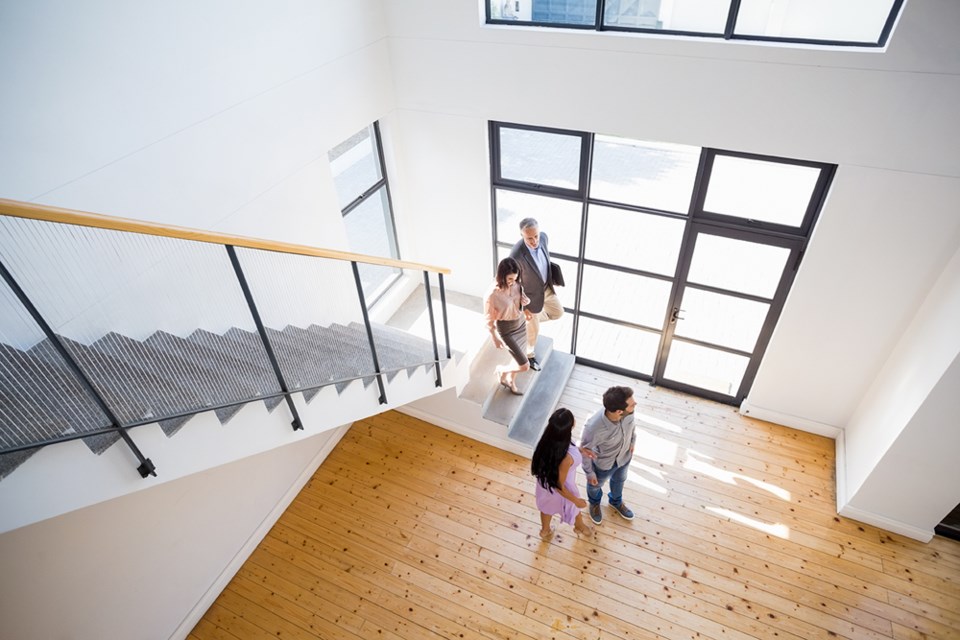The latest real estate stats suggest buyers have the whip hand — and while sales and house prices are down across Metro Vancouver, Squamish is experiencing a milder version of the slump.
Lisa Bjornson, managing broker of Royal LePage Black Tusk Realty, said Squamish is partly bucking a regional trend.
The Real Estate Board of Greater Vancouver reported that residential home sales saw a 14.4 percent decrease from a year earlier and a 34.7 percent drop from the 10-year average for June home sales.
But Bjornson noted that things look brighter for Squamish homeowners.
"When I look at the sales activity just for the month of June in Squamish last year, we sold 11 detached, 15 townhomes and we sold 14 apartments," she said. "In June of this year, we sold 17 detached — that's up — and were slightly off on apartments and townhouses, which were down to 11 and 11."
That mixed bag is accompanied by a couple of other oddities. While sales have decreased, prices have not seen a parallel decline.
"Buyers are just taking more time to come to their buying decision," she said, adding that sellers are patiently waiting for a buyer willing to pay the asking price, or something close.
Posted mortgage rates in Canada have inched lower, so stress test benchmark has followed suit Across Metro Vancouver, the benchmark price for all residential properties was $998,700 in June, a decline of 9.6 percent a year earlier. In Squamish, the benchmark is $765,900, a decline of 4.7 percent. Within those numbers, detached home sale prices in Squamish declined 4.4 percent since last year, while townhouse prices dropped 8.7 percent and apartments stayed almost steady, with a drop of a paltry 0.3 percent.
Slowdowns are happening at the top and bottom of the market, Bjornson said, with prices going down on properties over $1.5 million, while financing challenges for first-time buyers are making it tough on the more affordable range. In the middle though, detached homes with suites in the $900,000 to $1.2 million range are getting snapped up fairly quickly, Bjornson said. Two- and three-bedroom apartments are also moving, because they combine value with flexibility.
"You can work at home, you can have a roommate, you can expand your family, all that sort of stuff," Bjornson said.
Something she suggests first-time buyers consider is a two-step process.
"Buy yourself a nice townhome, get into the market, get your equity, over time hopefully your income appreciates, you pay your mortgage down a little and, three years from now, you make that jump," she said. "You're in the market, so your money is protected. You're on the field. Then, when you want to make that next jump, you'll be more comfortable."
Ultimately, she said, while the market fluctuates, some things never change.
"You always need a place to live," said Bjornson. "You need a roof over your head, so why wouldn't you pay yourself? Why would you be paying somebody else's mortgage? Build equity. The average human being makes their money in real estate. None of those things have changed."
Something else that hasn't changed is steady demand for commercial real estate in Squamish, according to Darren McCartney, who specializes in commercial sales and leasing with RE/MAX Sea To Sky Real Estate.
Regardless of residential sales, the population growth in Squamish and the region means there is a lot of interest among businesses setting up in Squamish.
"Retail interest has been increasing, simply because our population is going up and therefore we are getting more depth in the regional market, which is very welcome," he said. Retail and other commercial vacancy is low, which means rates — purchase prices or leasing costs — are going up.
"Some people complain about rates going up, but what it means is there's the viability to set up a retail business," said McCartney. "You may see some retail businesses shut their doors, but others are opening up that may be more in tune with the market."
On the industrial side, supply cannot meet demand.
"We don't really deliver product fast enough for the market," he said, noting that all available warehouse space gets sold or leased almost as soon as it becomes available.
In the office sector, McCartney said lots of local businesses are ready to expand but can't find space. He sees a little bit of interest from companies wanting to come to Squamish for the first time, but most growth in the office sector is organic — existing local businesses are growing. Meeting these demands is a challenge because current high costs for construction make building commercial and industrial properties less attractive to developers.

The Squamish real estate scene bucks the big-picture Metro Vancouver numbers because this is sort of a "micro-market," according to McCartney.
"We're going to benefit from the economic activity in the greater Vancouver area, but we've got a lot of local things going on like Woodfibre, potential ski resort applications, the local economy starting to get legs, redefining itself really, from an industry town to this rec-tech, warehouse distribution economy, [and] professional services. I think you'll see steady growth still on the commercial side."
Find out what's happening in the Metro Vancouver housing market with our latest Market Insights video https://t.co/Bdnsplfuq2 #vanre
— REBGV (@REBGV) July 10, 2019
Ashley Smith, president of the Real Estate Board of Greater Vancouver, acknowledges that Squamish isn't seeing the severity of declines that other parts of the region are.
"While they're still following the trend, some of the disparity or price fluctuations haven't been as severe in Squamish, which is interesting to see," she said, adding that no part of the region is unaffected by the prevailing trends.
The softening of the regional real estate market began about a year ago, partly as a result of the federal government's "B-20" mortgage stress test, which makes it more challenging for first-time buyers to get financing.
"We think that responsible lending is really important, but it's possible that the rigid requirements we're looking at today might not be in an appropriate context anymore," said Smith. "Especially as interest rates have come up a bit since they first introduced it."
She also said the province's property speculation tax reduced purchaser confidence.
"We would like to encourage the provincial government to do away with that," she said. "At the end of the day, we know that there is an affordability issue in greater Vancouver and we don't think suppressing the demand side is going to address some of the long-term housing needs."



